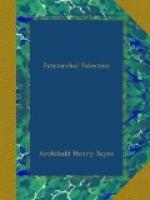Malchiel and Tagi also write to the Pharaoh. According to Tagi the roads between Southern Palestine and Egypt were under the supervision and protection of his brother; while Malchiel begs for cavalry to pursue and capture the enemy who had made war upon Su-yardata and himself, had seized “the country of the king,” and threatened to slay his servants. He also complains of the conduct of Yankhamu, the High Commissioner, who had been ordered to inquire into the conduct of the governors in Palestine. Yankhamu, it seems, had seized Malchiel’s property and carried off his wives and children. It was doubtless to this act of injustice that Labai alludes in his letter of exculpation.
The territory of which Jerusalem was the capital extended southward as far as Carmel of Judah, Gath-Carmel as it is called by Ebed-Tob, as well as in the geographical lists of Thothmes III., while on the west it reached to Keilah, Kabbah, and Mount Seir. No mention is made of Hebron either in the Tel el-Amarna letters or in the Egyptian geographical lists, which are earlier than the rise of the nineteenth dynasty. The town must therefore have existed under some other name, or have been in the hands of a power hostile to Egypt.
The name of Hebron has the same origin as that of the Khabiri, who appear in Ebed-Tob’s letters by the side of Labai, Babylonia, and Naharaim as the assailants of Jerusalem and its territory. The word means “Confederates,” and occurs in the Assyrian texts; among other passages in a hymn published by Dr. Bruennow, where we read, istu pan khabiri-ya iptarsanni, “from the face of my associates he has cut me off.” The word, however, is not Assyrian, as in that case it would have had a different form, but must have been borrowed from the Canaanitish language of the West.
Who the Khabiri or “Confederates” were has been disputed. Some scholars see in them Elamite marauders who followed the march of the Babylonian armies to Syria. This opinion is founded on the fact that the Khabiri are once mentioned as an Elamite tribe, and that in a Babylonian document a “Khabirite” (Khabira) is referred to along with a “Kassite” or Babylonian. Another view is that they are to be identified with Heber, the grandson of Asher (Gen. xlvi. 17), since Malchiel is said to be the brother of Heber, just as in the letters of Ebed-Tob Malchiel is associated with the Khabiri. But all such




